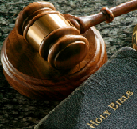British law has no place for Christianity, despite the UK’s long history of religious observance  and the traditions of the established Church, the High Court has said.
and the traditions of the established Church, the High Court has said.
The ruling was condemned for further restricting the right of Christians to manifest their beliefs.
Lord Justice Munby and Mr Justice Beatson made the remarks when ruling on the case of a Christian couple, Owen and Eunice John, who were banned from being foster carers because of their view that homosexual conduct is wrong.
The judges held that, in the case of fostering arrangements at least, the right of gays and lesbians to equality “should take precedence” over the right of Christians to manifest their beliefs and moral values.
In a ruling with potentially wide-ranging implications, the judges said Britain was a “largely secular”, multi-cultural country in which the laws of the realm “do not include Christianity”.
Campaigners for homosexual rights welcomed the judgment for placing “21st-century decency above 19th-century prejudice”. Christian campaigners claimed that it undermined the position of the Church of England.
The ruling is the latest in a series of judgments in which Christians have been defeated in the courts for breaching equality laws by manifesting their beliefs on homosexuality.
Senior churchmen, including Lord Carey, the former Archbishop of Canterbury, recently began a campaign urging Christians to stand up for their rights and have petitioned the Prime Minister to review human rights laws.
In their ruling yesterday, the judges complained that it was not yet “well understood” that British society was largely secular and that the law has no place for Christianity.
“Although historically this country is part of the Christian West, and although it has an established church which is Christian, there have been enormous changes in the social and religious life of our country over the last century,” they said.
It was a “paradox” that society has become simultaneously both increasingly secular and increasingly diverse in religious affiliation, they said.
“We sit as secular judges serving a multicultural community of many faiths. We are sworn (we quote the judicial oath) to ‘do right to all manner of people after the laws and usages of this realm, without fear or favour, affection or ill will’.”
The judges acknowledged that there was a “tension” in the case of Mr and Mrs Johns between the rights of individuals to maintain their religious beliefs and the rights of homosexual people to live free from discrimination.
However, when fostering regulations were taken into account, “the equality provisions concerning sexual orientation should take precedence” over religious rights, they said.
The Rt Rev Michael Nazir-Ali, the former bishop of Rochester, described the judgment as “absurd”. He pointed out the monarch took a coronation oath promising to uphold the laws of God, while Acts of Parliament are passed with the consent of “the Lords Spiritual”, and the Queen’s Speech finishes with a blessing from Almighty God.
“To say that this is a secular country is certainly wrong,” he said.
“However, what really worries me about this spate of judgments is that they leave no room for the conscience of believers of whatever kind. This will exclude Christians, Muslims and Orthodox Jews from whole swaths of public life, including adoption and fostering.”
Speaking personally, Canon Dr Chris Sugden, the executive secretary of Anglican Mainstream, said the judges were wrong to say religion was a matter of private individuals’ beliefs.
“They are treating religion like Richard Dawkins does, as if Christian faith was on a parallel with Melanesian frog worship,” he said.
Meanwhile, the Daily Telegraph editorial described the ruling as “a disgrace”.
It said: “Equality laws are supposed to uphold the rights to religious belief.
“Yet the High Court ruled that laws protecting people from discrimination because of their sexual orientation “should take precedence” over the right not to be discriminated against on religious grounds.
“Why has it been left to judges to decide whose rights trump those of others?
“Perhaps there is a historical irony here, because we are witnessing a modern, secular Inquisition – a determined effort to force everyone to accept a new set of orthodoxies or face damnation as social heretics if they refuse.”















